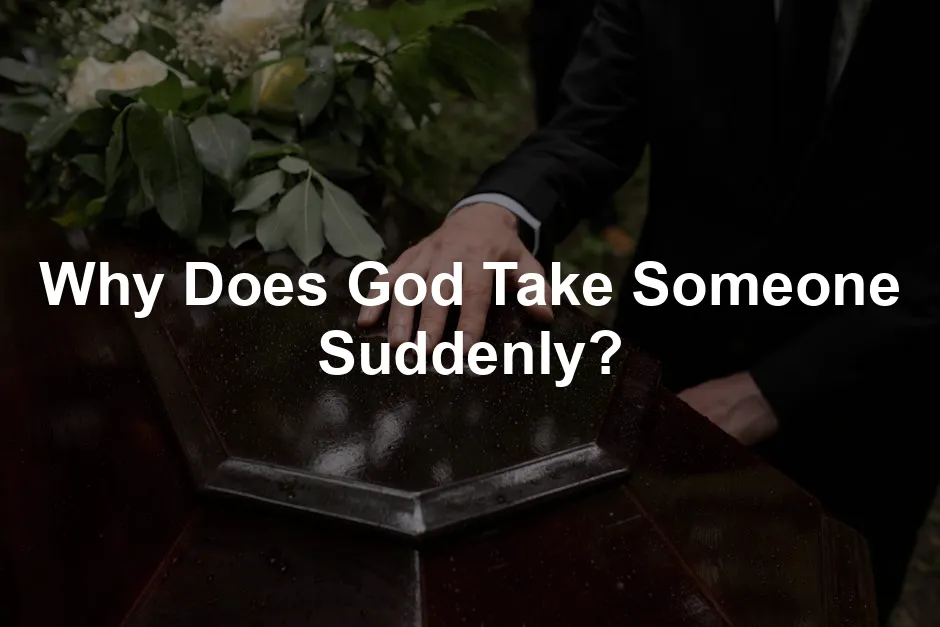
Why Does God Take Someone Suddenly?
Introduction
Sudden loss can shake our world. It brings emotional turmoil and deep sorrow. Many wonder why God allows such heart-wrenching events. This article aims to provide insights and a deeper understanding of this painful reality.
If you’re looking for a guide to help navigate these turbulent waters, consider picking up The Grief Recovery Handbook by John W. James. This book offers practical steps to help you cope with your loss and find a path toward healing.
Summary and Overview
This section explores the complex themes surrounding sudden death. The question, “Why does this happen?” often weighs heavily on grieving hearts. We will discuss the emotional impact on families and individuals. Various perspectives reveal multifaceted reasons behind unexpected deaths, including theological, emotional, and psychological views.
Faith plays a crucial role in navigating such crises. Understanding different perspectives can ease the grieving process. Coping mechanisms, community support, and personal reflection become vital. Ultimately, this journey leads us toward healing, offering hope amid loss.
Another remarkable read is When Breath Becomes Air by Paul Kalanithi. This poignant memoir reflects on the intersection of life and death from the perspective of a doctor and patient, offering profound insights into what it means to live fully in the face of mortality.
Understanding Sudden Death
The Nature of Life and Death
Death is an unavoidable part of human existence. Every person will face it eventually. It reminds us of our mortality, a theme echoed in various biblical texts. For instance, Hebrews 9:27 states, “It is appointed unto men once to die.” Philosophical perspectives also emphasize that life is a cycle, filled with beginnings and endings. Our time on Earth is fleeting, yet its significance is profound. Each moment is a gift, shaping our relationships and experiences. Understanding death helps us appreciate life more deeply. Embracing this reality can foster personal growth and a stronger connection with our loved ones.
Speaking of connections, Being Mortal by Atul Gawande dives into how modern medicine can help us confront death and find meaning in our lives, making it a must-read for anyone grappling with these profound questions.

The Role of Free Will
Free will plays a significant role in our lives and the concept of unexpected death. We have the power to make choices, which can lead to unforeseen circumstances. Sometimes, decisions made by ourselves or others can result in tragic outcomes. This perspective emphasizes human agency and accountability. The freedom to choose comes with consequences—both good and bad. It can lead to moments of joy or, sadly, to sudden loss. Recognizing this connection can help us understand that while we cannot control everything, our choices matter greatly.
Theological Perspectives
God’s Plan vs. Human Understanding
Many believe God’s plan is beyond our understanding. This perspective invites us to trust in a higher purpose. Isaiah 55:8-9 reminds us, “For my thoughts are not your thoughts, neither are your ways my ways.” Such scriptures suggest that human comprehension is limited. Our lives are woven into a divine tapestry, often unseen. We may feel lost when we experience sudden loss. Yet, faith encourages us to trust in God’s greater design. This journey can deepen our spiritual path and strengthen our relationship with Him. Embracing faith allows us to navigate through life’s complexities. Remember, our understanding is not the final word. Instead, it’s about trusting the divine plan that encompasses all.
For those who seek comfort in stories, Tuesdays with Morrie by Mitch Albom offers a touching perspective on life, love, and the lessons learned from death, making it a perfect companion for anyone navigating grief.

The Concept of Suffering
Suffering is a common theme in religious texts. Many scriptures address how loss can lead to personal growth. Romans 5:3-4 states, “Suffering produces perseverance; perseverance, character; and character, hope.” This suggests that enduring hardship can shape our faith. When we face pain, we often find deeper spiritual insights. Suffering may lead us to reflect on our lives and relationships. Instead of seeing it solely as a negative experience, we can view it as a catalyst for growth. Embracing our grief can help us develop resilience and a stronger connection to our faith. Ultimately, suffering can be a pathway to transformation and spiritual development.
To further explore the journey of grief, consider The Year of Magical Thinking by Joan Didion. It’s a beautifully written account of grief that captures the surreal experience of loss and the longing for what once was.

Emotional Responses to Sudden Loss
The Grieving Process
Experiencing sudden loss can be overwhelming. Everyone grieves differently. Commonly, people go through five stages: denial, anger, bargaining, depression, and acceptance.
In denial, you may struggle to believe the loss is real. Anger often follows, directed at God, the universe, or even the person who passed away. Bargaining comes next, where you might wish for a different outcome. Depression can set in as the reality hits hard, leading to feelings of sadness and emptiness. Finally, acceptance allows you to find peace.
Coping mechanisms vary widely. Some lean on friends and family for support. Others might find comfort in solitude or creative outlets. Each person’s journey through grief is unique, reflecting their emotional healing process. Understanding why understanding emotional responses is crucial for mental health can greatly aid in this process.
Recognizing the importance of emotional responses can help individuals navigate through their grief more effectively. why understanding emotional responses is crucial for mental health
Questions and Doubts
After sudden loss, many grapple with faith-related questions. “Why did God allow this?” or “Is my loved one in a better place?” These doubts can stir deep emotional turmoil.
Anger towards God is common. You might feel abandoned or betrayed. It’s important to acknowledge these feelings without guilt. Navigating through them can be challenging but crucial for healing.
Talk about your feelings, whether with friends, family, or a counselor. Sharing your doubts can provide comfort and clarity. Remember, it’s okay to question your faith during tough times. Seeking answers is part of the healing journey.
For those looking for a deeper understanding, A Grief Observed by C.S. Lewis is an introspective exploration of grief that can resonate deeply with anyone wrestling with similar questions.

Finding Meaning and Purpose After Loss
The Search for Answers
When sudden death strikes, many look for meaning. It’s natural to ask, “Why did this happen?” People often share stories about finding peace after loss. For instance, a woman lost her brother unexpectedly. In her grief, she sought solace in his favorite books. Each page brought her closer to understanding his life.
Another individual found comfort in community support. He shared his experience during group sessions, helping others navigate their grief. These testimonies remind us that seeking meaning is part of healing. It’s a journey where each story contributes to a shared understanding of loss.
Finding purpose amid grief can guide us toward healing, encouraging inner reflection. The process may be difficult, but it leads to a greater appreciation for life and the loved ones we’ve lost.
The Importance of Community and Support
Community plays a vital role in healing after loss. Surrounding ourselves with supportive friends and family creates a safety net. This network helps us process our emotions and share our experiences.
Consider joining a support group. These spaces allow individuals to connect with others who understand their pain. Sharing stories fosters empathy and connection, reminding us we are not alone.
Building relationships is crucial during this time. Reach out to old friends or meet new ones. Attend local events or participate in online forums. Each connection provides comfort and strength on this healing journey. Together, we find hope and resilience in community support.
If you’re interested in a supportive read, consider Option B by Sheryl Sandberg. This book provides a powerful perspective on resilience, helping readers see that joy can coexist with loss.

Conclusion
Navigating sudden loss is challenging. Finding meaning and embracing community support can ease the journey. Remember, it’s okay to grieve and seek answers. Hope often emerges from faith and connection with others. Take practical steps forward, whether through support groups or personal reflection. Embrace the love around you and trust that healing is possible.
Additionally, if you’re looking to pamper yourself during this tough time, consider treating yourself to a Weighted Blanket. It’s perfect for cozying up while you read or reflect, providing comfort during those moments when you need it most.
Please let us know what you think about our content by leaving a comment down below!
Thank you for reading till here 🙂
All images from Pexels




